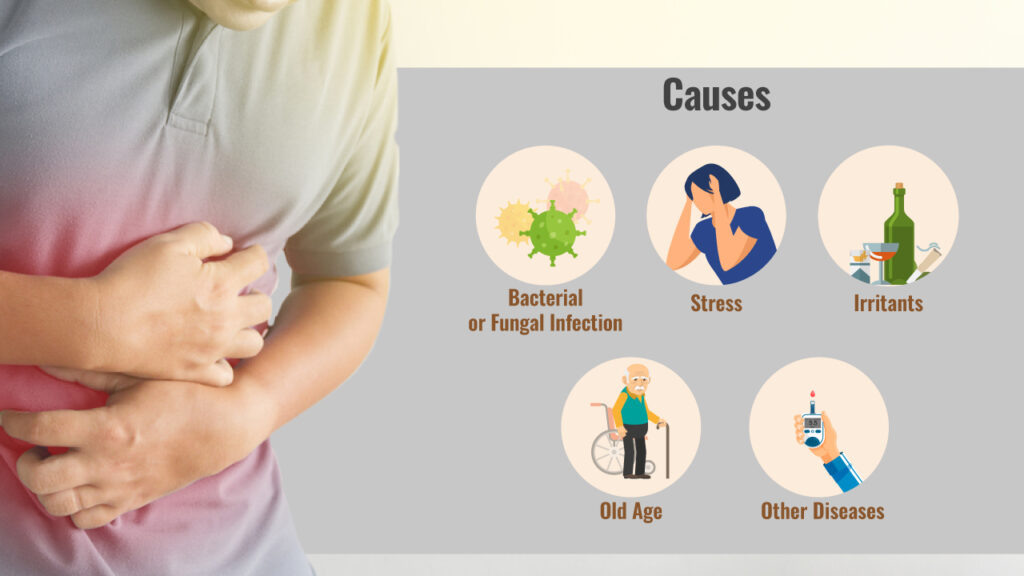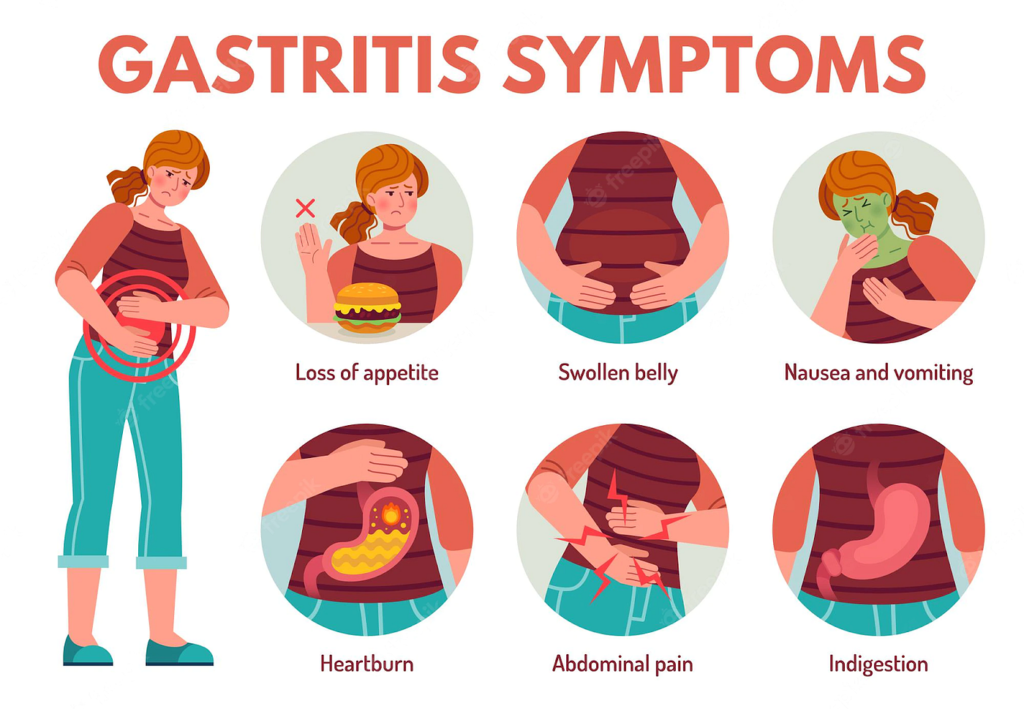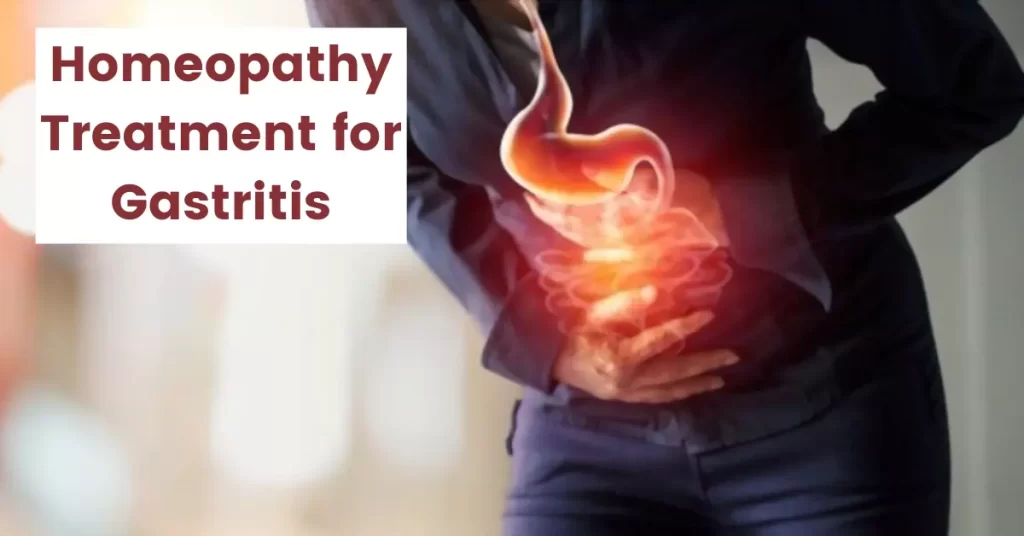Gastritis is a medical term used for conditions in which the protective lining of the stomach gets inflamed. This article will cover the homeopathic medicine for gastritis, its causes, symptoms, types, risk factors, management & best medicines.
Gastritis occurs due to infections which bacteria and other harmful microorganisms.
Conditions such as gastric (stomach) ulcers, use of certain drugs and alcohol are the major factors that contribute to the development of gastritis.
Gastritis can develop gradually over time or it can be sudden.
In most cases, it gets easily treated but in some cases, it may lead to the formation of the stomach or gastric ulcers or even gastric cancer.
Let’s take a look at different aspects of gastritis in detail.

Gastritis Types
Acute gastritis:
Gastritis can be sudden in onset with clear cut symptoms, and it may also lead to complications, for example, bleeding.
The commonest cause of acute gastritis is overuse of NSAID (Non-steroidal anti-inflammatory drug).
Alcoholism and other underlying diseases also play a role in the development of acute gastritis.
Stress can also lead to acute gastritis.
Chronic gastritis:
Chronic gastritis is the long-standing repeated inflammation of the protective lining of the stomach.
In chronic gastritis, the function and protection of the stomach are affected over a long period.
Atrophic gastritis:
Atrophic gastritis causes the destruction or death of glands present in the stomach which is replaced by the scar (fibrous tissues).
Atrophic gastritis affects the functioning of the stomach. It kills the essentials cells.
These cells secrete important digestive juices. In atrophic gastritis, the important digestive juices are not properly available for digestion.
In this way, it affects the normal functioning of the stomach. Atrophic gastritis leads to serious complications, for example, iron deficiency or vitamin B12 deficiency.
Antral gastritis:
Antral gastritis occurs in the lower portion of the stomach (also known as antrum).
This type of gastritis is more commonly found in the old age group.
The causative factors can be bacteria, viruses, certain medications or stomach injury.
Inflammation in the stomach leads t indigestion and a burning sensation in the stomach.
Autoimmune gastritis:
When the body’s immunity mistakenly starts harming its cells (of the stomach) then it leads to the development of autoimmune gastritis.
This leads to decreased production of important digestive juices secreted by stomach cells.
This results in symptoms, for example, indigestion, bloating etc. In this type of gastritis, there is a disturbance in the production of gastric acid and vitamin B12.
Autoimmune gastritis can create serious complications such as iron, folate or vitamin B12 deficiency or even cancer.
Erosive gastritis:
In erosive gastritis, there is a formation of ulcers and bleeding in the lining of the stomach. In this type of gastritis, the patient becomes uncomfortable every time he eats food.
Erosive gastritis mostly occurs due to the excessive use of certain drugs such as NSAIDs, steroids or anti-inflammatory drugs.
Sometimes it can also occur due to infections or food allergies.
Alcoholic gastritis:
Excessive consumption of alcohol leads to the development of alcoholic gastritis.
Alcohol interferes with the stomach’s ability to produce acids. It results in inflammation.
Gastritis Causes
Gastritis is the inflammation in the stomach lining. Injury or weaknesses in the stomach’s protective lining makes the digestive juices harm the stomach wall.
Let’s discuss the major causes of gastritis.
Helicobacter Pylori bacteria:
The most common bacteria that cause infection and is responsible for gastritis is Helicobacter Pylori. It affects the stomach’s protective lining.
Regular intake of certain medicines:
Patients who use pain killers regularly can develop gastritis. Medicines such as NSAIDs (Non-Steroidal Anti Inflammatory Drugs), ibuprofen etc.
Regular or excessive use of these medications can harm the barrier or the protective lining of the stomach.
Excess alcohol consumption:
Alcohol harms and erodes the stomach’s protective lining.
This leads to increased chances of the stomach’s wall getting harmed by the digestive juices. It can often lead to acute gastritis.
Chemotherapy:
Cancer treatment such as chemotherapy or radiation therapy may also cause gastritis.
Old age group:
The stomach’s protective lining thins ut with age. Therefore, older people can develop gastritis more commonly.
Underlying diseases:
Some diseases, for example, Crohn’s disease, HIV (AIDS), celiac disease or parasitic infections can be associated with the development of gastritis.

Gastritis Symptoms
In some people, gastritis doesn’t cause any noticeable symptoms. The most commonly found symptoms of gastritis are:
Indigestion:
The patient may complain of indigestion and feeling of fullness in the upper part of the abdomen. Eating sometimes aggravates the symptoms.
Nausea and vomiting:
Nausea and vomiting can be early symptoms of a gastritis patient. Vomiting of blood in some cases of erosive gastritis can be found.
Bloating:
A feeling of fullness in the upper abdomen after food.
Black or tarry stools:
The patient may notice that the colour of the stool changes to black or becomes tarry in appearance.

Risk Factors for Gastritis
Let’s take a look at the common risk factors for gastritis.
Stress:
Extreme stress can play a role in the development of gastritis.
Autoimmune disorders:
Autoimmune disorders make the body’s immune system attack its healthy cells. This can lead to damage to the stomach’s barrier or protective lining.
People suffering from autoimmune disorders are at major risk of developing gastritis.
Other diseases and infections:
People suffering from other diseases of the stomach such as Crohn’s disease or any viral infection are also prone to develop gastritis.
Use of products such as tobacco or cocaine:
People who consume cocaine or who are habitual of tobacco can develop gastritis.
Gastritis Diagnosis
The doctor will make the diagnosis based on your symptoms. Then he will advise some investigations to confirm the diagnosis.
Test for Helicobacter Pylori:
The doctor may advise you a stool test or breath test to identify the presence of H. Pylori bacteria in your body.
Blood test:
The blood test will help in determining complications. Thereby, helping in deciding the treatment plan.
Endoscopy:
A tube with a camera is used to examine the inner organs. It will help to identify the signs of inflammation.
A tissue sample can be taken for biopsy to confirm the presence of H.pylori bacteria.
X-Ray:
X-Ray of the upper digestive tract helps to identify ulcers more clearly. A series of x-rays are done after a barium swallow.
It is a white metallic liquid (that contains barium) that lines the digestive tract.
Gastritis Management
Let’s discuss some tips and tricks that will help in the management and fast recovery of the disease.
Avoid alcohol:
Alcohol can cause gastritis and regular intake of alcohol can develop complications.
Maintain proper hygiene:
Maintain good hygiene to avoid bacterial or viral infections. Wash hands properly.
Keep your surroundings clean. Food and water should be free of any contamination.
Avoid stress:
Protect your mental health to reduce the risk of developing self-induced gastritis.
Quit smoking:
Smoking worsens the symptoms of gastritis. It can also hinder the recovery process.
Eat smaller meals at regular intervals:
To avoid indigestion and bloating, regular and smaller meals should be taken at regular intervals.
Best Homeopathic Medicine for Gastritis
Homeopathy offers a safe, gentle, and permanent treatment for gastritis.
There are wonderful remedies in Homeopathy which are capable of treating gastritis in every age group and gender.
Homeopathic remedies for gastritis can manage both acute and chronic cases of gastritis with much efficiency.
Let’s discuss top Homeopathic remedies indicated for the treatment of gastritis.
1. NUX VOMICA: For gastritis with pain after eating
Nux vomica is one of the best medicine in homeopathy for the treatment of patients suffering from gastritis.
The patient complains of a sour taste in the mouth. There is nausea in the morning after eating.
There is a sensation of weight and pain in the stomach, worse after eating. There is much bloating and flatulence.
Eructations are sour and bitter. The patient feels ravenous hunger. After eating, the patient has a feeling of indigestion.
The upper part of the abdomen feels as if there is a pressure of a stone. The patient wants to vomit but he cannot.
The patient desires stimulants and coffee. There is always issue related to the stomach such as gas, indigestion.
Potency and dosage:
Nux vomica 1M can be taken as four pills or drops once a week till improvement occurs. Nux vomica 200CH can be taken as four pills or drops once daily till improvement occurs.
Nux vomica in 30CH can be taken as four pills or drops twice daily till improvement occurs.
2. HYDRASTIS CAN: For gastritis with weak digestion
Hydrastis Canadensis is a very helpful remedy for patients suffering from gastritis.
It provides quick relief and improves digestion. There is a sore feeling in the stomach which can be constant.
The patient suffers from weak digestion.
There is a bitter taste in the mouth. The patient feels like an empty gone sensation in the upper part of the abdomen.
The patient can feel pulsations in the epigastrium. The patient cannot eat bread and vegetables.
Hydrastis Canadensis is capable of treating gastritis and ulcers in the stomach.
Potency and dosage:
Hydrastis Canadensis 1M can be taken as four pills or drops once a week till improvement occurs. Hydrastis Canadensis 200CH can be taken as four pills or drops once daily till improvement occurs.
Hydrastis Canadensis in 30CH can be taken as four pills or drops twice daily till improvement occurs.
It can also be taken in mother tincture form i.e., Q potency, ten drops in half cup of water twice daily till improvement occurs.
3. MERCURIUS SOL: For gastritis with continuous hunger
Merc Sol is a very beneficial remedy for gastritis patients. It is capable of completely curing the symptoms.
The patient experiences putrid eructations. The patient has an intense thirst for cold drinks.
There is weak digestion with continuous hunger. The stomach becomes sensitive to touch.
There are many hiccoughs. The food regurgitates back to the mouth from the food pipe.
The patient feels constricted. If these symptoms are present Merc Sol will be the best choice.
Potency and dosage:
Merc Sol 1M can be taken as four pills or drops once a week till improvement occurs.
Merc Sol 200CH can be taken as four pills or drops once daily till improvement occurs.
Merc Sol in 30CH can be taken as four pills or drops twice daily till improvement occurs.
4. ANTIMONIUM CRUDUM: For gastritis with loss of appetite
Antimonium crudum is a very beneficial homeopathic remedy for people suffering from gastritis with loss of appetite.
The patient desires pickles and acids. The patient feels very thirsty in the evening and the night.
There is belching with the taste of ingested food. The patient complains of nausea, vomiting and heartburn (burning sensation in the chest along the food pipe).
Bread, pastries, sour things, wine, cold bathing, overheating can worsen the symptoms of gastritis in the patient of Antimonium Crudum.
There is constant belching which makes the patient very uncomfortable. There is always bloating after eating food.
Potency and dosage:
Merc Sol 1M can be taken as four pills or drops once a week till improvement occurs. Merc Sol 200CH can be taken as four pills or drops once daily till improvement occurs.
Merc Sol in 30CH can be taken as four pills or drops twice daily till improvement occurs.
5. ARGENTUM NITRICUM: For gastritis in alcoholics
Argentum Nitricum is helpful for treating patients with gastritis who are alcoholics. Belching accompanies most of the gastric symptoms.
The patient suffers from nausea, retching and vomiting. It is flatulence with painful swelling of the pit of the stomach.
The patient complains of a painful spot in the stomach that radiates to all parts of the stomach. There is constrictive and burning pain in the stomach.
There is a trembling and throbbing sensation in the stomach.
There is the formation of ulcers in the stomach with radiating pain. The patient wants to eat cheese and salt.
Potency and dosage:
Argentum Nitricum 1M can be taken as four pills or drops once a week till improvement occurs.
Argentum Nitricum 200CH can be taken as four pills or drops once daily till improvement occurs.
Argentum Nitricum in 30CH can be taken as four pills or drops twice daily till improvement occurs.
6. ARSENIC ALBUM: For gastritis with burning pain
The patient cannot bear the sight and smell of food. The patient has a great thirst, he drinks much, but very little at a time.
He prefers to drink water sip by sip. There is nausea and vomiting after eating food. The patient has a feeling of anxiety in the pit of the stomach with great burning pains.
The ingested food keeps coming back to the mouth via the food pipe. This leads to excoriation of the throat.
The vomiting sometimes consists of blood, bile or green mucus. There is a feeling of irritation in the stomach.
The patient feels as if the stomach is torn. Ice cream, vinegar worsen the symptoms.
The patient is mentally very anxious and fearful. Watery fruits and vegetables make the suffering worse. There is a sensation as if the food is lodged in the stomach.
Potency and dosage:
Arsenic Album 1M can be taken as four pills or drops once a week till improvement occurs. Arsenic Album 200CH can be taken as four pills or drops once daily till improvement occurs.
Arsenic Album in 30CH can be taken as four pills or drops twice daily till improvement occurs.
7. PHOSPHORUS: For gastritis with much nausea and vomiting
Phosphorus is one of the best remedies in homeopathy for gastritis patients. There is sour belching every time after food.
The patient throws up the ingested food after eating. There is a characteristic symptom of vomiting after drinking water as soon as it gets warm in the stomach.
The pain in the stomach is better with cold food and ice. The abdomen is painful to touch. Walking worsens the symptoms.
The burning extends from the stomach to other parts of the abdomen.
Potency and dosage:
Phosphorus 1M can be taken as four pills or drops once a week till improvement occurs. Phosphorus 200CH can be taken as four pills or drops once daily till improvement occurs.
Phosphorus in 30CH can be taken as four pills or drops twice daily till improvement occurs.
8. BISMUTH: For much gagging and vomiting of watery fluid
The patient vomits with very convulsive gagging and pain. There is vomiting of water as soon as it reaches the stomach.
There is belching after eating. The patient vomits all fluid. There is a burning sensation in the stomach. The food pipe seems as of loaded.
The patient complains of slow digestion with offensive belching. The symptoms are better by cold drinks but as soon as the stomach is full, the patient vomits.
Potency and dosage:
Bismuth 1M can be taken as four pills or drops once a week till improvement occurs. Bismuth 200CH can be taken as four pills or drops once daily till improvement occurs.
Bismuth in 30CH can be taken as four pills or drops twice daily till improvement occurs.
9. LYCOPODIUM: For gastritis with excessive hunger
There is excessive hunger in the patients of Lycopodium. The patient wants to eat sweet things.
The patient says that the food tastes sour. The digestion is very weak. The patient always feels bloated.
After food, there is a bitter taste in the mouth and a sensation of pressure in the stomach. Even little food causes bloating.
There is incomplete belching that leads to burning in the food pipe for long hours.
The patient wakes up hungry at night with a sinking feeling in the stomach.
Potency and dosage:
Lycopodium 1M can be taken as four pills or drops once a week till improvement occurs. Lycopodium 200CH can be taken as four pills or drops once daily till improvement occurs.
Lycopodium in 30CH can be taken as four pills or drops twice daily till improvement occurs.
10. IPECAC: For gastritis with constant nausea
Ipecac is a wonderful homeopathic remedy capable of treating all the complaints associated with constant nausea.
The tongue of the patient is very clean. The mouth is moist with too much saliva. There is a feeling of constant nausea and vomiting.
The face becomes pale and twitches while vomiting. The vomiting consists of food, bile, mucus and sometimes blood.
The patient complains of belching. The stomach feels hanging down and relaxed.
When these symptoms match, Ipecac is the best remedy.
Potency and dosage:
Ipecac 1M can be taken as four pills or drops once a week till improvement occurs. Ipecac 200CH can be taken as four pills or drops once daily till improvement occurs.
Ipecac in 30CH can be taken as four pills or drops twice daily till improvement occurs.
Remember that homeopathic remedies are prescribed based on individual symptoms and characteristics. It’s crucial to consult with a qualified homeopath for proper evaluation and personalized treatment. Homeopathy focuses on treating the whole person, so a detailed case study is necessary to select the most appropriate remedy.
Homeopathic medicines should be taken only when prescribed by a homeopathic physician. Self-medication may aggravate the original conditions.

